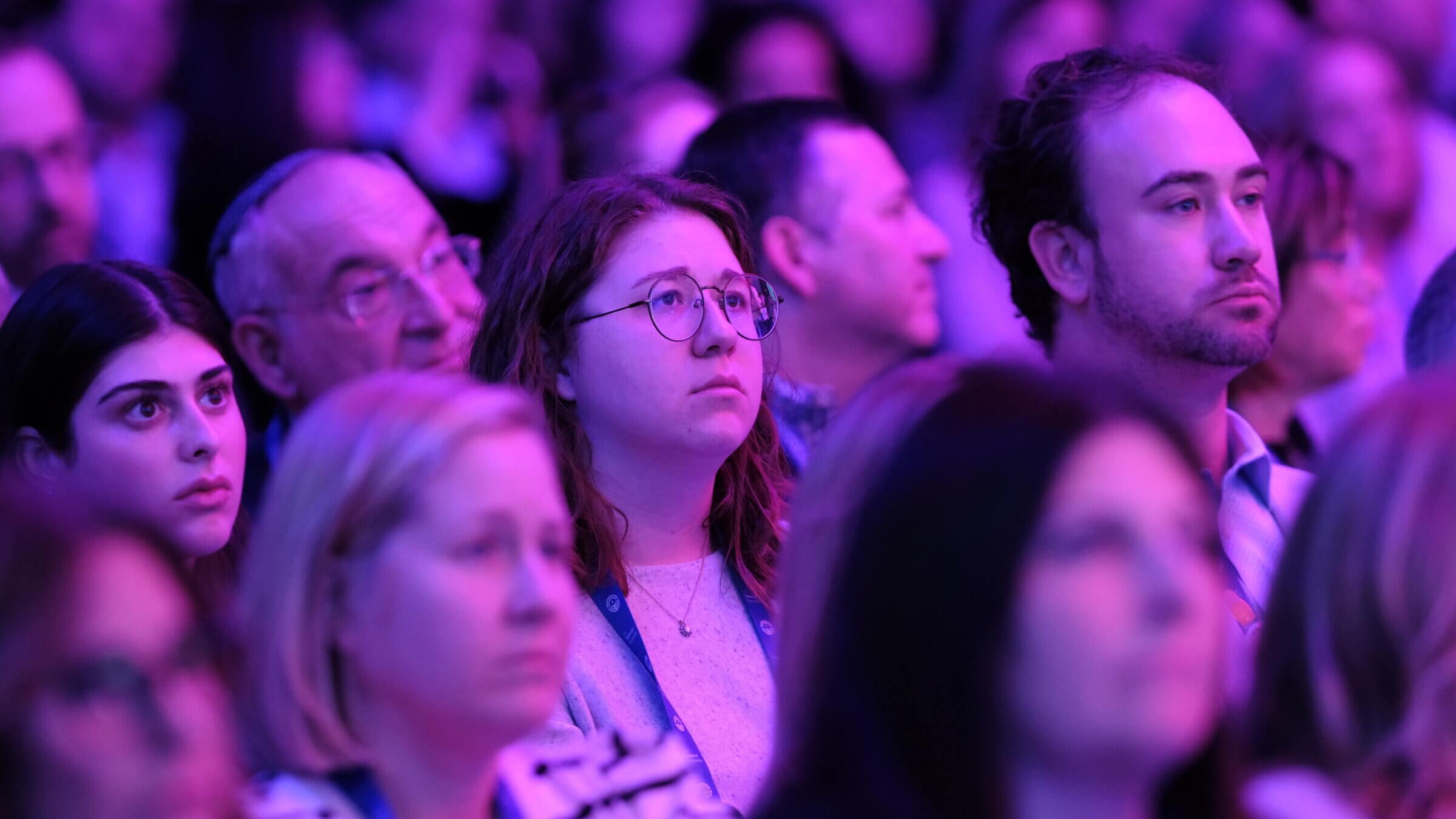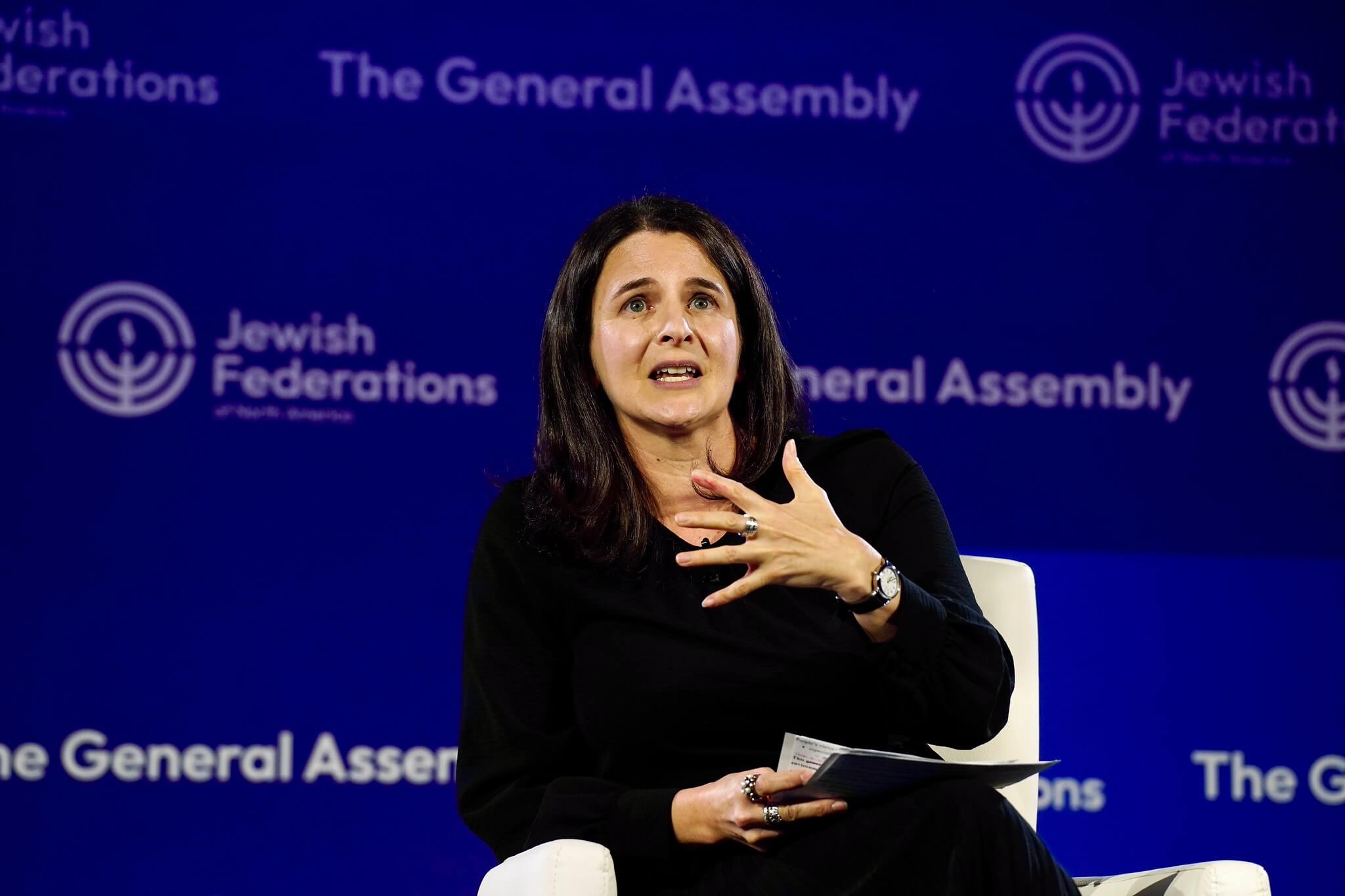As young Jews move away from Israel, Jewish leaders are reluctant to change their approach
Widespread recognition of a generational split on Israel clashed with an unapologetic tone of support for the country at the Jewish Federations of North America conference

Audience members watch the opening plenary of the Jewish Federations of North America’s annual conference in Washington, D.C., on Sunday. Courtesy of Jewish Fedeations of North America
WASHINGTON — Anna Langer stood behind the podium earlier this week at one of the largest gatherings of Jewish professionals in the world and laid out hard facts on the relationship between American Jews and Israel. Her most striking point: that younger Jews are more than twice as likely to identify as anti-Zionist than the overall population.
“It’s a growing segment of our young people, and it’s an area we must pay attention to,” said Langer, who runs domestic Israel strategy for the Jewish Federations of North America, which helps direct hundreds of millions of dollars in funding for Jewish programming and organizes the annual conference.
From the event’s main stage, Rahm Emmanuel warned that the Israel-Hamas war had battered the country’s reputation among a generation of young American Jews in the same way that the 1967 War had invigorated their parents’ support of Israel. “We have our work cut out,” Emmanuel said.
But despite broad concern that many young Jews are abandoning Israel, few of the experts and organizations at the event seemed open to changing much of anything about their approach in order to reach these disaffected members of the community. Instead, the solutions proposed by Jewish educators and philanthropists involved doubling down on existing strategies: cultivating warm feelings toward Israel through more sponsored trips and education, while dismantling the forces — including social media and teachers unions — that they believe are causing young Jews to sour on the country.
“It’s very easy to slide into anti-Zionism.”Sarah HurwitzAuthor of As a Jew
“TikTok is just smashing our young people’s brains all day long with videos of carnage in Gaza,” Sarah Hurwitz, Michele Obama’s former speechwriter who has written two books about Jewish identity, told the audience of some 2,000 Jewish professionals. “This is why so many of us can’t have a sane conversation with younger Jews.”
Eric Fingerhut, the head of JFNA, said that two of his organization’s top priorities were facilitating the sale of TikTok to Larry Ellison, the pro-Israel tech mogul who owns Oracle, and countering the influence of the National Education Association, a teachers union that has expressed hostility toward Israel.
“This is a technology coming from outside this country,” Fingerhut said, referring to TikTok’s Chinese ownership. He added that antisemitism and criticism of Israel on social media was “a global attack on Jewish people and the state of Israel, funded with billions and billions — probably trillions — of dollars, fueled by some of the most sophisticated algorithms.”
(A spokesperson said in a text message that he was referring to online influence and disinformation campaigns from China, Russia and Iran.)

Another frequent refrain at the conference was that the real solution to communal divisions was a stronger commitment to what Jonathan Greenblatt, CEO of the Anti-Defamation League, described as “Jewish education, Zionist identity and Torah learning.”
“These are the essential elements of a healthy constitution for our community,” he said.
Hurwitz, too, suggested that young Jews were drifting from Israel because their Jewish identities had been reduced to “a big empty void.”
“Young people who have that empty Jewish identity today — it is being filled by antisemitism,” she said. “It’s very easy to slide into anti-Zionism.”
***
On the sidelines of the conference, however, some attendees said that the belief young Jews critical of Israel were simply devoid of a meaningful Jewish identity overlooked some of the reality. Young Jews remain both supportive of a Jewish state in Israel and emotionally attached to the country. Despite reporting deep levels of discomfort with Israel’s actions, they have joined the “surge” of Jewish engagement that followed the Oct. 7 Hamas terrorist attack in Israel, showing up in increased numbers to synagogues and Jewish events.
“Disengagement is not our problem,” Langer, the JFNA executive, told a group assembled to discuss the future of Israel education. “Rather, it’s our ability to hold space for complexity and cultivate belonging in a deeply connected — and yet deeply divided — community.”
She pointed to statistics that showed half of American Jews believe the community does not allow for nuanced conversations about the war in Gaza. And nearly 70% found it hard to support actions taken by the Israeli government, even though only 7% of Jews report avoiding communal institutions over these concerns.
Langer said the research suggested Israel education needed to feature more nuance: “When students perceive their education as one-sided or incomplete, it undermines their trust and engagement.”
Jon Falk, vice president of Israel engagement and antisemitism for Hillel International, said his organization had brought Palestinian speakers to its chapters to help address this desire. “I believe that Hillel brings more Palestinian voices to campus than even SJP,” Falk said, referring to Students for Justice in Palestine.
But despite acknowledging that young Jews are deeply uncomfortable with Israel — around 65% of Jews under 40 say that Israel’s actions often conflict with their moral, political and Jewish values, according to data presented at the conference — there was no suggestion that Jewish organizations should move away from ironclad support for Israel.
One sticking point may be that, according to Langer, when you consider American Jews of all ages, they are evenly divided over whether communal institutions should be more supportive or more critical of Israel. And many young Jews continue to have a positive relationship with Israel.

“It sounds wonderful to say that we should be a community and serve everyone,” said David Cygielman, the CEO of Mem Global, which runs a network of group houses for young Jews. “But how does that play out? And does that alienate people who are coming to be part of a strong, vibrant Jewish community who love and want to engage with Israel?”
The reluctance of experts who spoke at the conference to consider shifting their Israel strategy was underscored by the absence of liberal pro-Israel groups at the event. J Street was not represented at the conference, nor was the Jewish Council for Public Affairs, one of the most progressive Jewish establishment organizations, which for decades maintained a formal relationship with the federation network.
As for how attendees who were there positioned themselves politically, they overwhelmingly sided with John Podhoretz, a conservative journalist who argued against the feasibility of a two-state solution to the Israeli-Palestinian conflict during a mainstage debate.
And when Greenblatt was asked gently about divisions within the Jewish community over how to fight antisemitism, including criticism of the ADL’s recent announcement that it was creating a Mamdani Monitor to track the new, and Muslim, mayor of New York City, he expressed confidence that his organization had taken the correct approach.
“I am a ferocious and unapologetic Zionist,” Greenblatt said. “Anyone who wants me to apologize: Get in line.”
***
One strategy experts did, repeatedly, endorse was travel to Israel, which plummeted following the COVID-19 pandemic, as a solution to eroding support for the country among both Jews and non-Jews, even as they acknowledged that participating in those kinds of trips now came with “a lot of social isolation and punishment” for participants.
“Imagine if every federation across North America took 100 public school educators and administrations to Israel every year,” said Jenna Potash, an executive at UJA-Federation of Toronto. “That’s really something we should focus on.”
And on the rare occasion that speakers did make allowances for criticizing Israel, many suggested that those discussions take place only in private.
“You need to lead with proud support for Israel, standing publicly and legislatively with Israel in unmatched times of vilification,” Langer said. “At the same time, we need to create internal spaces for honest, nuanced and educational conversations about Israel.”
Yet the bulk of speakers seemed to reject the notion that any consolation was needed for Jews who were uncomfortable with the Jewish establishment’s traditional support for Israel. Mark Charendoff, who runs the influential right-leaning Maimonides Fund, said he was in the process of recalibrating the organization’s focus to fighting the enemies of the Jewish people, after years focusing on reaching young Jews.
Charendoff said this new strategy means building alliances with people who “we might disagree with on 80%” so long as “we agree with them on Israel.”
“Our enemies are trying to normalize anti-Zionism,” Charendoff said. “We have to renormalize Israel as part of the conversation and psyche and ethos of American Jewry.”
















